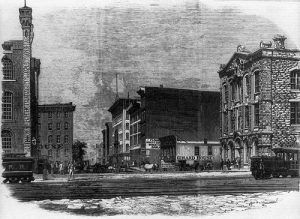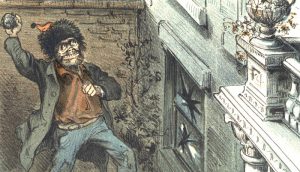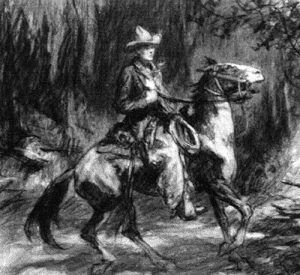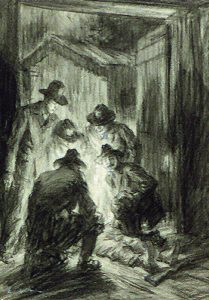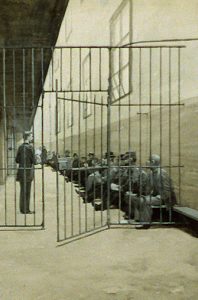By Emerson Hough in 1905
The great cities and the great wildernesses are the two homes for bold crimes, but we have been most largely concerned with the latter in our studies of desperados and in our search for examples of disregard for the law. We have found turbulence, self-insistence, vigor, and self-reliance in the American character, sometimes leading to lawlessness on our Western frontier.
Conditions have changed. We still revel in Wild West literature, but there is little of the wild left in the West of today, little of the old lawlessness. The most lawless time in America is today, but the most lawless parts of America are the most highly civilized parts. The most dangerous section of America is not the West but the East.
The worst men are no longer those of the mountains or the plains but of the great cities. The most absolute lawlessness exists under the shadow of the tallest temples of the law and in the innermost of that society, which boasts itself as the supreme civilization of the world. We have had no purpose in these pages to praise any crime or to glorify any manner of bad deeds, but if we were forced to make a choice among criminals, then by all means, that choice should be, must be, not the brutal murderer of the cities, but the desperado of the old West. One is an assassin, the other is a warrior, the other is a dastard, and the other is something of a man.
Lawlessness that arises to magnitude is not called lawlessness, and killing more than murder is called war. The great industrial centers show us what ruthlessness may mean, crueler and more dangerous than the worst deeds of our border fighting men. As for the criminal records of our great cities, they surpass those of the rudest wilderness anarchy by infinity. Their nature, at times, would cause a hardened desperado of the West to blush for shame.
One distinguishing feature of the city’s badness is the great number of crimes against women, ranging from robbery to murder. Now, the desperado, the bandit, the robber of the wildest West never made war on any woman, rarely ever robbed a woman, even when women mingled with the victims of a “stand and deliver” general robbery of a stage or train. The man who would kill a woman in the West could never meet his fellow in a fair fight again. The rope was ready for him, and that was right quickly.
But how is it in the great cities, under the shadow of the law? Forget the crimes of industrialism, sweatshops, and factories, which undermine a nation’s last hope—the constitution of its women—and take the open and admitted crimes. One city will suffice for this, possibly the city of Chicago.
In Chicago, in the last quarter of the 19th Century, very nearly two thousand murders were committed. Of these, two hundred remain mysteries today, their perpetrators having gone free and undetected. In the past year, seventeen women have been murdered in Chicago, some under circumstances too horrible to mention. In a list of fifty murders by unknown parties during the last few years, the whole gamut of dastardly crime has been run. The slaughter list is appalling. The story of this killing of women is so repellant that one turns to the bloodiest deeds of Western personal combats with a feeling of relief, and as one does so, one adds, “Here at least were men.”
The story of Chicago is a little worse, according to her population than that of New York, Boston, or any large city. Foot up the total of the thousands of murders committed every year in America. Then, if you wish to become a criminal statistician, compare that record with those of England, France, or Germany. We kill ten persons to England’s one, and we kill them in the cities.
In the cities, it is unlawful to wear arms, and protecting oneself against an armed attack is, therefore, impossible. In the cities, we have policemen. Against real fighting men, the average policeman would be helpless. Yet, such as he is, he must be the sole fence against the bloody-minded who do not scruple at robbery and murder. In the labor riots, the streets of a city are avenues of anarchy, and none of our weak-souled officials, held in the cursed thrall of politics, seems able to prevent it. A dozen town marshals of the old stripe would restore peace and fill a graveyard in one day of any strike, and their peace would be permanent. A real town marshal at the head of a city police force, with real fighting men under him, could restore peace and fill a graveyard in one month in any city, and that peace would be permanent. If we wished for the law, we could have it.
The history of the bloodiest lawlessness of the American past shows continual repetitions. First, liberty is construed to mean license, and license un-rebuked leads to insolence. Still left un-rebuked, license organizes against the law, taking the form of gangs, factions, and bandit clans.
Then, in time, the spirit of law arises, and not the law, but the offended individuals wronged by too much license, take the matter into their own hands, not waiting for the courts but executing a swifter justice. It is the terror of lynch law that has, in countless instances, been the foundation of the later courts, with their slow-moving and absurdly inefficient methods. In time, the inefficiency of the courts once more begets impatience and contempt. The people again rebel at the fact that their government gives them no government, that their courts give them no justice, and that their peace officers give them no protection. Then, they take matters into their own hands again and show both courts and criminals that the people are still strong and terrible.
The deprecation of lynch law and the whining cry that the law should be supported, that the courts should pass on the punishment, is, in the first place, the plea of the weak, and in the second place, the plea of the ignorant. He has not read the history of this country and has never understood the American character who says lynch law is wrong. It has been the salvation of America a thousand times. It may perhaps again be her salvation.
In one way or another, the American people will assert the old vigilante principle that a man’s life, given him by God, and a man’s property, earned by his own labor, are things he is entitled to defend or have defended. He never wholly delegates this right to any government. He may rescind his qualified delegation when he finds his chosen servants unfaithful or inefficient, so he must clean his own great and imperishable human rights again. A wise law and one enforced is tolerable. An unjust and impure law is intolerable, and it is no wrong to cast off allegiance to it. If so, Magna Charta was wrong, and the American Revolution was Earth’s greatest example of lynch law!
Conclusions parallel to these are expressed by no less a citizen than Andrew D. White, long United States Minister to Germany, who, in the course of an address at a prominent university in America in the year 1906, made the following bold remarks:
“There is a well-defined criminal class in all of our cities, a class of men who make crime a profession. Deaths by violence are increasing rapidly. Our record is now larger than any other country in the world. The number of homicides that are punished by lynching exceeds the number punished by due process of law. There is nothing more nonsensical or ridiculous than the goody-goody talk about lynching. Much may be said in favor of Goldwin Smith’s quotation that ‘there are communities in which lynch law is better than any other.’
“The pendulum has swung from extreme severity in the last century to extreme laxity in this century. There has sprung up a certain sentimental sympathy. In the words of a distinguished jurist, ‘the taking of life for the highest crime after due process of law is the only taking of a life which the American people condemn.’
“In the next year, 9,000 people will be murdered. As I stand here today, I tell you that 9,000 are doomed to death with all the cruelty of the criminal heart and with no regard for home and families, and two-thirds will be due to the maudlin sentiment sometimes called mercy.
“I have no sympathy for the criminal. My sympathy is for those who will be murdered, for their families, and for their children. This sham humanitarianism has become a stench. The cry now is for righteousness. The past generation has abolished human slavery. It is for the present to deal with the problems of the future and, among them, this problem of crime.”
Against the doctrine of this sort, none will protest but the politicians in power, under whose lax administration of a great trust there has arisen one of the saddest spectacles of human history, the decay of the great American principles of liberty and fair play. The criminals of our city are bold because they, if not ourselves, know of this decay. They, if not ourselves, know the weakness of that political system to which we have, in carelessness equaling that of the California miners of old — a carelessness based upon a madness of money equal to or surpassing that of the gold stampedes — delegated our sacred personal rights to live freely, to own property, and to protect each for himself his home.”
The End.
By Emerson Hough, 1907. Compiled and edited by Kathy Alexander/Legends of America, updated April 2024.
About the Author: Excerpted from the book The Story of the Outlaw; A Study of the Western Desperado, by Emerson Hough; Outing Publishing Company, New York, 1907. This story is not verbatim, as it has been edited for clerical errors and updated for the modern reader. Emerson Hough (1857–1923).was an author and journalist who wrote factional accounts and historical novels of life in the American West. His works helped establish the Western as a popular genre in literature and motion pictures. For years, Hough wrote the feature “Out-of-Doors” for the Saturday Evening Post and contributed to other major magazines.

